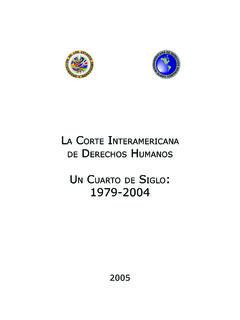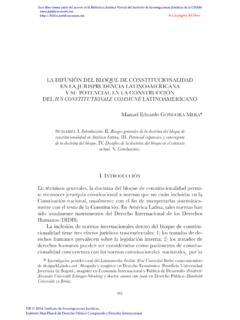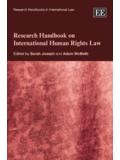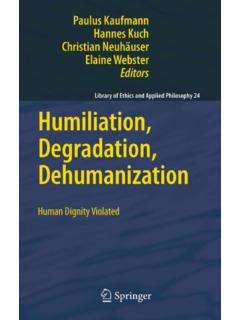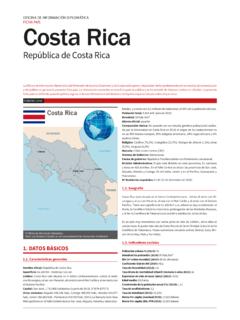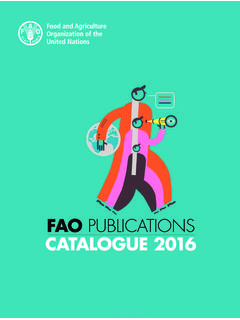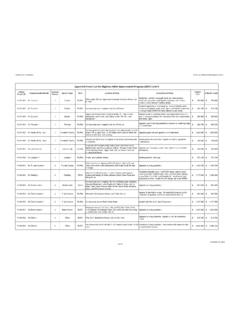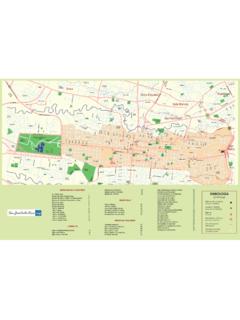Transcription of INTER-AMERICAN COURT OF HUMAN RIGHTS …
1 INTER-AMERICAN COURT OF HUMAN RIGHTS ADVISORY OPINION OC-24/17 OF NOVEMBER 24, 2017 REQUESTED BY THE REPUBLIC OF costa RICA GENDER IDENTITY, AND EQUALITY AND NON-DISCRIMINATION OF SAME-SEX COUPLES STATE OBLIGATIONS CONCERNING CHANGE OF NAME, GENDER IDENTITY, AND RIGHTS DERIVED FROM A RELATIONSHIP BETWEEN SAME-SEX COUPLES (INTERPRETATION AND SCOPE OF ARTICLES 1(1), 3, 7, 11(2), 13, 17, 18 AND 24, IN RELATION TO ARTICLE 1, OF THE AMERICAN CONVENTION ON HUMAN RIGHTS ) The INTER-AMERICAN COURT of HUMAN RIGHTS (hereinafter the INTER-AMERICAN COURT or the COURT ), composed of the following judges: Roberto F. Caldas, President Eduardo Ferrer Mac-Gregor Poisot, Vice President Eduardo Vio Grossi, Judge Humberto Antonio Sierra Por to, Judge Elizabeth Odio Benito, Judge Eugenio Ra l Zaffaroni, Judge, and L. Patricio Pazmi o Freire, Judge; also present, Pablo Saavedra Alessandri, Secretary, and Emilia Segares Rodr guez, Deputy Secretary, pursuant to Article 64(1) of the American Convention on HUMAN RIGHTS (hereinafter the American Convention or the Convention ) and Articles 70 to 75 of the Rules of Procedure of the COURT (hereinafter the Rules of Procedure ), issues this Advisory Opinion, structured as follows: 2 Table of contents I.
2 PRESENTATION OF THE REQUEST .. 3 II. PROCEEDINGS BEFORE THE COURT .. 5 III JURISDICTION AND ADMISSIBILITY .. 10 A. The advisory jurisdiction of the COURT in relation to this request .. 11 B. The requirements of admissibility of the request .. 12 IV. GENERAL CONSIDERATIONS .. 14 A. Glossary .. 14 B. Regarding this request for an advisory opinion .. 21 C. Regarding the structure of this advisory opinion .. 28 V. INTERPRETATION CRITERIA .. 28 VI. THE RIGHT TO EQUALITY AND NON-DISCRIMINATION OF LGBTI PERSONS .. 31 A. The right to equality and non-discrimination .. 31 B. Sexual orientation, gender identity and gender expression as categories protected by Article 1(1) of the Convention .. 34 C. Differences in treatment that are discriminatory .. 41 VII. THE RIGHT TO GENDER IDENTITY AND THE NAME CHANGE PROCEDURE .. 42 A. The right to identity .. 42 B. The right to recognition of juridical personality, the right to a name, and the right to gender identity.
3 48 C. The procedure for requesting the rectification of identity data to conform with the self-perceived gender identity .. 53 a) The procedure for the complete rectification of the self-perceived gender identity .. 54 b) The procedure should be based solely on the free and informed consent of the applicant without requirements such as medical and/or psychological or other certifications that could be unreasonable or pathologizing .. 56 c) The procedure and the changes, corrections or amendments to the records should be confidential and the identity document should not reflect the change in gender identity .. 58 d) The procedure should be prompt and, if possible, cost-free .. 60 e) Regarding the requirement to provide evidence of surgical and/or hormonal therapy 61 f) The procedures in relation to children .. 63 g) The nature of the procedure .. 66 D. Article 54 of the Civil Code of costa Rica .. 67 VIII. INTERNATIONAL PROTECTION OF RELATIONSHIPS BETWEEN SAME-SEX COUPLES.
4 69 A. The treaty-based protection of the relationship between same-sex couples .. 70 B. The mechanisms States could use to protect diverse families .. 77 IX. 83 3 I. PRESENTATION OF THE REQUEST 1. On May 18, 2016 , the Republic of costa Rica (hereinafter costa Rica or the requesting State ), based on Articles 64(1) and 64(2) of the American Convention1 and in accordance with the provisions of Articles 702 and 723 of the Rules of Procedure, presented a request for an advisory opinion concerning the interpretation and scope of Articles 11(2),4 185 and 246 of the American Convention on HUMAN RIGHTS , in relation to Article 17 of this instrument (hereinafter the request ). Specifically, costa Rica presented the request for an advisory opinion for the COURT to rule on:8 a. [T]he protection provided by Articles 11(2), 18 and 24 in relation to Article 1 of the [American Convention] to the recognition of a change of name in accordance with the gender identity of the person concerned.
5 B. [T]he compatibility with Articles 11(2), 18 and 24, in relation to Article 1 of the Convention of the practice of applying Article 54 of the Civil Code of the Republic of costa Rica,9 Statute No. 63 of September 28, 1887, to persons wishing to change their name based on their gender identity. 1 Article 64 of the American Convention: 1. The member states of the Organization may consult the COURT regarding the interpretation of this Convention or of other treaties concerning the protection of HUMAN RIGHTS in the American states. Within their spheres of competence, the organs listed in Chapter X of the Charter of the Organization of American States, as amended by the Protocol of Buenos Aires, may in like manner consult the COURT . 2. The COURT , at the request of a member state of the Organization, may provide that state with opinions regarding the compatibility of any of its domestic laws with the aforesaid international instruments.
6 2 Article 70 of the COURT s Rules of Procedure: 1. 1. Requests for an advisory opinion under Article 64(1) of the Convention shall state with precision the specific questions on which the opinion of the COURT is being sought. 2. Requests for an advisory opinion submitted by a Member State or by the Commission shall, in addition, identify the provisions to be interpreted, the considerations giving rise to the request, and the names and addresses of the Agent or the Delegates. 3. If the advisory opinion is sought by an OAS organ other than the Commission, the request shall also specify how it relates to the sphere of competence of the organ in question, in addition to the information listed in the preceding paragraph. 3 Article 72 of the COURT s Rules of Procedure: 1. A request for an advisory opinion presented pursuant to Article 64(2) of the Convention shall indicate the following: a. the provisions of domestic law and of the Convention or of other treaties concerning the protection of HUMAN RIGHTS to which the request relates; b.
7 The specific questions on which the opinion of the COURT is being sought; c. the name and address of the requesting party s Agent. 2. Copies of the domestic laws referred to in the request shall accompany the application. 4 Article 11(2) of the American Convention: Right to Privacy. [..] 2. No one may be the object of arbitrary or abusive interference with his private life, his family, his home, or his correspondence, or of unlawful attacks on his honor or reputation. 5 Article 18 of the American Convention: Right to a Name. Every person has the right to a given name and to the surnames of his parents or that of one of them. The law shall regulate the manner in which this right shall be ensured for all, by the use of assumed names if necessary. 6 Article 24 of the American Convention: Right to Equal Protection. All persons are equal before the law. Consequently, they are entitled, without discrimination, to equal protection of the law.
8 7 Article 1 of the American Convention: Obligation to Respect RIGHTS . 1. The States Parties to this Convention undertake to respect the RIGHTS and freedoms recognized herein and to ensure to all persons subject to their jurisdiction the free and full exercise of those RIGHTS and freedoms, without any discrimination for reasons of race, color, sex, language, religion, political or other opinion, national or social origin, economic status, birth, or any other social condition. 2. For the purposes of this Convention, "person" means every HUMAN being. 8 The complete text of the request [in Spanish only] can be consulted on the COURT s website at the following link: 9 Article 54 of the Civil Code of costa Rica establishes that: Every costa Rican national registered in the Civil Registry may change his or her name with the authorization of the COURT and this shall be obtained by means of the corresponding voluntary jurisdiction proceeding.
9 4 c. [T]he protection provided by Articles 11(2) and 24 in relation to Article 1 of the [America Convention] to the recognition of the patrimonial RIGHTS derived from a relationship between persons of the same sex. 2. costa Rica set out the considerations that had given rise to the request indicating that: Recognition of the HUMAN RIGHTS derived from sexual orientation and gender identity has been characterized by diverse processes in the different member States of the INTER-AMERICAN system. It further indicated that [a] wide range of situations can be distinguished, from countries that have fully recognized RIGHTS to lesbian, gay, bisexual, transgender and intersex persons, to those member States that, to date, maintain in force laws that prohibit any form of lifestyle and expression contrary to heteronormativity or that have failed to recognize the RIGHTS that relate to these groups.
10 In addition, it recognized that, in the cases of Atala Riffo and daughters v. Chile and Duque v. Colombia, the COURT had determined that actions denigrating a person based on either their gender identity, or especially as in these cases, sexual orientation, constituted a type of discrimination that the Convention provided protection against. Despite this, costa Rica indicated that it was unsure about the extent of the prohibition of discrimination based on sexual orientation and gender identity or, in other words, that problems remained when determining whether certain actions are included in such category of discrimination. Accordingly, it asserted that an interpretation by the INTER-AMERICAN COURT on the standards indicated above would make a significant contribution to the State of costa Rica and all the countries of the INTER-AMERICAN system of HUMAN RIGHTS , because it would allow them to adapt their domestic laws to the INTER-AMERICAN standards, providing a guarantee to individuals and their RIGHTS .
